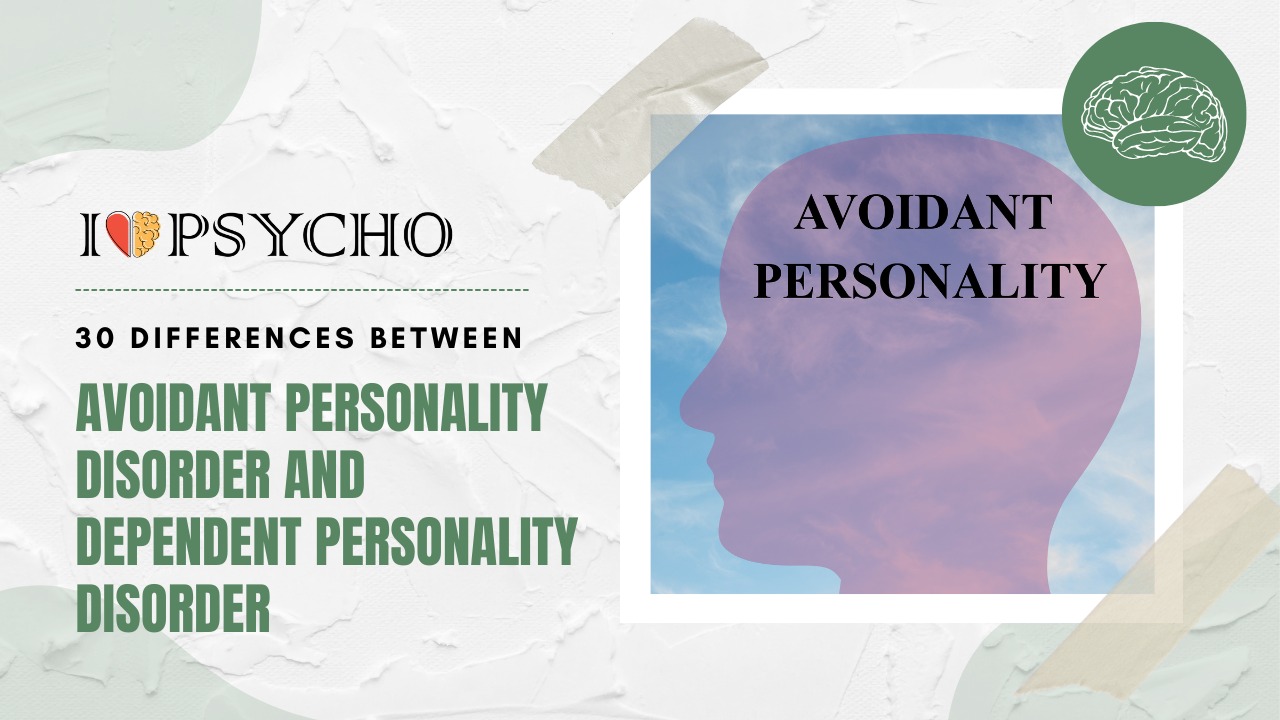The DSM-5 classifies Avoidant Personality Disorder (AvPD) and Dependent Personality Disorder (DPD) as cluster C personality disorders. Though identical, their ideas, feelings, and behaviors differ, leading to various clinical presentations.
APD is characterized by an overwhelming fear of rejection, criticism, and shame. Because of their fear of humiliation, people with AvPD are sensitive to criticism and avoid social situations. Fearing failure, they may shun new relationships and activities owing to their low self-esteem. They frequently have considerable social anxiety, which can affect their daily life and relationships. AvPD is chronic and widespread, limiting an individual’s capacity to interact with people and enjoy life.
In contrast, Dependent Personality Disorder involves an overwhelming desire for others’ care. Those with DPD dread being abandoned or left alone. They have trouble starting tasks and rely on others to make judgments. Reliance on others for emotional and practical assistance can make it hard to retain a self-identity and put them at danger of exploitative situations. DPD patients may actively pursue relationships, yet they are docile and subservient to maintain support and acceptance.
AvPD and DPD vary most in their core anxieties and behaviors. Fear of rejection and humiliation causes social avoidance and low self-esteem in AvPD. DPD is characterized by submissiveness and difficulties in making decisions due to a fear of abandonment and a strong desire for others to support their emotional and practical requirements. Although they present differently, both diseases can adversely damage the quality of life and relationships. Psychotherapy like cognitive-behavioral therapy or dialectical behavior therapy addresses the underlying anxieties, beliefs, and behaviors that cause these diseases.
Also Read: 45 Difference Between Anxiety Disorders and Mood Disorders
Here are the 30 differences between Avoidant Personality Disorder (AvPD) and Dependent Personality Disorder (DPD):
|
S.No. |
Aspect |
Avoidant Personality Disorder (AvPD) |
Dependent Personality Disorder (DPD) |
|
1 |
Core Fear |
Fear of rejection and criticism |
Fear of abandonment and being alone |
|
2 |
Social Relationships |
Difficulty initiating and maintaining relationships |
Strong desire for close relationships |
|
3 |
Independence |
Prefers independence and self-reliance |
Prefers to rely on others for decisions |
|
4 |
Self-Esteem |
Low self-esteem, feels inadequate |
Low self-esteem, feels helpless |
|
5 |
Decision Making |
Prefers to make decisions independently |
Relies on others for decision-making |
|
6 |
Initiating Socializing |
Avoids social situations and initiation |
Anxious when alone, seeks company |
|
7 |
Attachment Style |
Often dismissive or fearful attachment |
Often preoccupied or anxious attachment |
|
8 |
Rejection Sensitivity |
Highly sensitive to perceived rejection |
Sensitive to perceived abandonment |
|
9 |
Loneliness |
May experience loneliness due to avoidance |
May fear loneliness and seek constant company |
|
10 |
Independence vs. Reliance |
Values independence and self-sufficiency |
Values reliance on others for support |
|
11 |
Self-Criticism |
Self-critical due to fear of criticism |
Self-critical due to fear of incompetence |
|
12 |
Anxiety in Relationships |
Anxious in social relationships |
Anxious when alone or without support |
|
13 |
Initiating Contact |
Avoids initiating contact with others |
Initiates contact to gain reassurance |
|
14 |
Relationship Dynamics |
Often reluctant to engage in relationships |
Often submissive and eager to please |
|
15 |
Trust in Others |
Distrustful of others’ intentions |
Tends to trust and rely on others |
|
16 |
Boundaries |
Tends to set strict personal boundaries |
Tends to have loose boundaries |
|
17 |
Need for Approval |
Desires approval but may avoid seeking it |
Constantly seeks approval and validation |
|
18 |
Coping Mechanisms |
Avoidance and withdrawal as coping mechanisms |
Seeking reassurance and support as coping mechanisms |
|
19 |
Autonomy vs. Dependency |
Values autonomy and independence |
Values dependency and attachment |
|
20 |
Self-Image |
Views self as unworthy or inferior |
Views self as incapable or helpless |
|
21 |
Dependency on Others |
Less dependent on others for emotional support in AvPD |
Highly dependent on others for emotional support |
|
22 |
Relationship Stability |
Struggles to maintain relationships |
Often stays in relationships even if unhealthy |
|
23 |
Social Anxiety |
Social anxiety due to fear of criticism |
Social anxiety related to being alone |
|
24 |
Emotional Independence |
Seeks emotional independence |
Seeks emotional dependence on others |
|
25 |
Fear of Abandonment |
Less focused on fear of abandonment |
Central fear is abandonment |
|
26 |
Autonomy in Daily Life |
Prefers autonomy in daily life |
Relies on others for daily decisions |
|
27 |
Relationship Control |
Tends to have more control in relationships |
Tends to give up control to others |
|
28 |
Self-Reliance |
Values self-reliance and self-sufficiency |
Values reliance on others for guidance |
|
29 |
Conflict Resolution |
May avoid conflict to maintain relationships |
May avoid conflict to prevent abandonment |
|
30 |
Treatment Approach |
CBT and exposure therapy are common approaches |
CBT and assertiveness training are common approaches |
Also Read: A Brief History of The Counseling Process and Its Stages
Frequently Asked Questions (FAQS)
Q.1 What is the difference between anxiety and stress?
Stress and anxiety are connected yet separate. Stress is a “fight or flight” physiological and psychological response to external forces. A normal response to difficult events. However, anxiety entails excessive concern, anticipation, or fear about future occurrences. Stress normally results from a specific stressor, but anxiety is a more generalized sensation of worry with no evident reason.
Q.2 Can introverts have strong social skills?
Yes, introverts may be socially adept. Introversion is a predisposition for isolation and introspection. Introverts don’t always lack social skills. Introverts often excel in listening, speaking, and empathy. They may prefer one-on-one or small-group chats over huge social events.
Q.3 What is the psychological nature-nurture debate?
The nature-nurture argument examines how genetics and the environment affect human development and behavior. It asks whether genetics or upbringing affect features and behaviors. Modern psychology broadly accepts that nature and nurture impact an individual’s traits, behaviors, and psychological qualities.
Q.4 What distinguishes depression from bipolar disorder?
Depression and bipolar disorder are mood illnesses with different symptoms. Depression causes extended poor mood, loss of interest, and energy, as well as hopelessness and worthlessness. Bipolar illness causes sadness and mania, which are characterized by heightened mood, impulsivity, and vigor. The mood swings between manic and depressed episodes are distinct.
Q.5 How do I enhance my emotional intelligence?
Emotional intelligence (EI) improves understanding, managing, and expressing emotions. Some tips:
- Focus on yourself: Consider your emotions and triggers.
- Develop empathy: Put yourself in others’ position to understand them.
- Improve communication: Actively listen and convey feelings.
- Manage stress: Relaxation can help with emotional issues.
- Develop relationships: Trust and empathy-based relationships.
- Control emotions: Practice emotional management.









